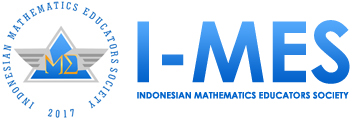PENGARUH PENERAPAN MODEL ELICITING ACTIVITIES TERHADAP KECAKAPAN MATEMATIS
Abstract
Penelitian ini bertujuan untuk (1) mengetahui apakah kecakapan matematis siswa kelas VII SMP Negeri 1 Kuta yang mengikuti pembelajaran dengan model eliciting activities lebih baik daripada siswa yang mengikuti pembelajaran konvensional, (2) mengetahui bagaimana model eliciting activities dapat mempengaruhi kecakapan matematis siswa. Metode penelitian ini adalah Mixed Methods dengan menggunakan concurrent embedded design, dengan metode primer berupa penelitian kuantitatif untuk memperoleh data yang utama dan metode sekunder berupa penelitian kualitatif sebagai data pendukung. Populasi penelitian adalah seluruh siswa Kelas VII SMP Negeri 1 Kuta tahun ajaran 2020/2021 yang berjumlah 372 siswa. Pengambilan sampel untuk data kuantitatif dilakukan dengan teknik cluster random sampling yang menghasilkan kelas VII 1 (33 siswa) sebagai kelas eksperimen dan kelas VII 5 (34 siswa) sebagai kelas kontrol. Pengambilan sampel untuk data kualitatif dilakukan dengan teknik purposive sampling yang memilih 6 perwakilan siswa berdasarkan hasil data kuantitatif. Desain penelitian kuantitatif yang digunakan dalam penelitian ini adalah post-test only control group design, sedangkan penelitian kualitatif menggunakan penelitian deskriptif. Data kuantitatif dikumpulkan dengan menggunakan tes uraian dan data kualitatif menggunakan lembar observasi, angket, dan wawancara. Berdasarkan hasil tes diperoleh nilai rata-rata siswa pada kelas eksperimen adalah 75,39 dan nilai rata-rata siswa pada kelas kontrol adalah 44,86. Berdasarkan hasil analisis data penelitian kuantitatif dapat disimpulkan bahwa kecakapan matematis siswa yang mengikuti pembelajaran dengan model MEAs lebih baik daripada kecakapan matematis siswa yang mengikuti pembelajaran konvensional (t = 7,49: p<0,05). Berdasarkan hasil analisis data penelitian kualitatif berupa lembar observasi, tampak langkah-langkah pembelajaran pada MEAs memberikan pengaruh kepada siswa. Langkah membuat penyelesaian matematis, merevisi solusi dan mempresentasikan solusi melatih siswa untuk menalar dan mengkomunikasikan hasil dari pemecahan masalah. Hasil angket siswa menunjukkan tanggapan yang positif, siswa lebih antusias dalam mengikuti pembelajaran dan menyelesaikan lembar kerja. Hasil wawancara menunjukkan siswa menyukai pembelajaran matematika menggunakan model MEAs. Hasil analisis data secara keseluruhan menunjukkan bahwa siswa menjadi lebih antusias dalam mengikuti kegiatan pembelajaran, memahami permasalahan yang diberikan, dan terlatih mengkomunikasikan hasil dari suatu pemecahan masalah.
Keywords
Full Text:
PDFReferences
Atieka, T. A., Budiana, I., Tinggi, S., Tarbiyah, I., & Village, I. (2019). Pengaruh Model Eliciting Activities ( Mea ’ S ) Terhadap Kemampuan Pemecahan Masalah Matematis Dan Self Confidence Siswa Pendahuluan, sebu. 5, 95–104.
Rowan, B, Correnti, R. & R. J. M. (2002). What large-scale survey research tells us about teacher effects on student achievement: Insight from the prospects study of elementary schools. Teachers College Record, 104, 1525–1567.
Candiasa, I. M. (2010a). Pengujian Instrumen Penelitian Disertai Aplikasi ITEMAN dan BIGSTEPS. SIngaraja: Universitas Pendidikan Ganesha.
Candiasa, I. M. (2010b). Statistik Univariat dan Bivariat Disertai Aplikasi SPSS. Singaraja: Universitas Pendidikan Ganesha.
Chamberlin, Skot and Moon, Si. (2008). How Does the Problem Based Learning Approach Compare to the Model-Eliciting Activity Approach in Mathematics?
Creswell, J. (1994). Research Design: Qualitative and Quantitative Approaches. London: SAGE Publications.
Edo, S.I., Hartono Y., & Putri, R. I. I. (2013). Investigating secondary school students’ difficulties in modeling problems PISA-model level 5 and 6. Journal on Mathematics Education, 4(1), 41–58.
Hartatiana, Darhim, dan N. (2018). Improving Junior High School Students’ Spatial Reasoning Ability Through Model Eliciting Activities with Cabri 3D. Canadian Center of Science and Education, 11, 1. https://doi.org/10.5539/ies.v11n1p148
Hiebert, J. (1997). Making Sense: Teaching and Learning Mathematics With Understanding. Portsmouth, NH: Heinemann.
Kaiser, G., & Siraman, B. (2006). A global survey of international perspectives on modelling in mathematics education. Zentralblatt Für Didaktik Der Mathematik, 38(3), 302–310.
Kilpatrick, Jeremy, Jane Swafford, and B. F. 2001. (2001). Adding It Up: Helping Children Learn Mathematics. Washington, DC: The National Academies Press.
Lesh, R., & Harel, G. (2003). Problem solving, modeling and local conceptual development. Journal, Mathematical Thinking and Learning: An International, 5(2/3), 157–190.
Lesh, R., Hoover, M., Hole, B., Kelly, A., & Post, T. (2000). Principles for Developing Thought-Revealing Activities for Students and Teachers. In A. Kelly & R. Lesh (Eds.), Handbook of Research in Mathematics and Science Education (pp. 113–149). Mahwah, NJ: Lawrence Erlbaum and Associates.
Lesh, R.A., & Zawojewshi, J. S. (2007). Problem solving and modeling. In F. Lester (Ed.), Second Hadbook of Research on Mathematics Teaching and Learning: A Project of the National Council of Teachers of Mathematics. Charlottr, NC: Information Age Publishing, 763–804.
Lesh, R. (2005). Trends in the evolution of models & modeling perspectives on mathematical learning and problem solving. Zentralblatt Fur Didaktik Der Mathematik, 36(6), 487–489.
Loucks-Horsley, S., & Matsumoto, C. (1999). Research on Professional Development for Teachers of Mathematics and Science. The State of the Scene. School Science and Mathematics, 99(5), 258–271.
Mousoudiles, N., Chistou, C., &Sriraman, B. (2008). From problem solving to modelling-A metaanalysis. Nordic Studies in Mathematics Education, 12(1), 23–47.
Mousoudiles. (2007). A modeling perspective in the teaching and learning of matehmatical problem solving. Cyprus: University of Cyprus.
Prahmana, R.C.I., & Suwasti, P. (2014). Local instruction theory on division in mathematics GASING. Journal on Mathematics Education, 5(1), 17–26.
Shulman, L. S. (1987). Knowledge and Teaching: Foundations of the New Reform. Harvard Educational Review, 57(1), 1–22.
Sugiyono. (2012). Metode Penelitian Pendidikan. Bandung: Alfabeta.
Ulya. (2016). Efektivitas Pembelajaran Matematika Model Eliciting Activities Berbantuan Lembar Kerja Siswa (LKS) Berbasis Kontekstual Terhadap Pemahaman Konsep dan Kemampuan Pemecahan Masalah Siswa.
Villegas-Reimers, E. (2003). Teacher Professional Development: An International Review of the Literature. UNESCO: International Institution for Educational Planning.
DOI: https://doi.org/10.36706/jls.v4i1.14809
Refbacks
- There are currently no refbacks.
Copyright (c) 2022 Lentera Sriwijaya : Jurnal Ilmiah Pendidikan Matematika

This work is licensed under a Creative Commons Attribution-NonCommercial 4.0 International License.
Jl. Srijaya Negara, Bukit Besar
Palembang - 30139 Indonesia
Indexed in:
Lentera Sriwijaya: Jurnal Ilmiah Pendidikan Matematika is licensed under a Creative Commons Attribution-NonCommercial 4.0 International License.
View My Stats



